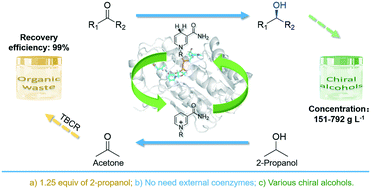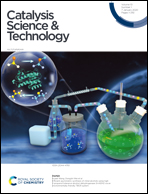Efficient asymmetric synthesis of chiral alcohols using high 2-propanol tolerance alcohol dehydrogenase SmADH2 via an environmentally friendly TBCR system†
Abstract
Alcohol dehydrogenases (ADHs) together with the economical substrate-coupled cofactor regeneration system play a pivotal role in the asymmetric synthesis of chiral alcohols; however, severe challenges concerning the poor tolerance of enzymes to 2-propanol and the adverse effects of the by-product, acetone, limit its applications, causing this strategy to lapse. Herein, a novel ADH gene smadh2 was identified from Stenotrophomonas maltophilia by traditional genome mining technology. The gene was cloned into Escherichia coli cells and then expressed to yield SmADH2. SmADH2 has a broad substrate spectrum and exhibits excellent tolerance and superb activity to 2-propanol even at 10.5 M (80%, v/v) concentration. Moreover, a new thermostatic bubble column reactor (TBCR) system is successfully designed to alleviate the inhibition of the by-product acetone by gas flow and continuously supplement 2-propanol. The organic waste can be simultaneously recovered for the purpose of green synthesis. In the sustainable system, structurally diverse chiral alcohols are synthesised at a high substrate loading (>150 g L−1) without adding external coenzymes. Among these, about 780 g L−1 (6 M) ethyl acetoacetate is completely converted into ethyl (R)-3-hydroxybutyrate in only 2.5 h with 99.9% ee and 7488 g L−1 d−1 space–time yield. Molecular dynamics simulation results shed light on the high catalytic activity toward the substrate. Therefore, the high 2-propanol tolerance SmADH2 with the TBCR system proves to be a potent biocatalytic strategy for the synthesis of chiral alcohols on an industrial scale.

- This article is part of the themed collections: Asymmetric catalysis, 2020 Catalysis Science & Technology Hot Articles and 2019 Catalysis Science & Technology HOT Articles


 Please wait while we load your content...
Please wait while we load your content...